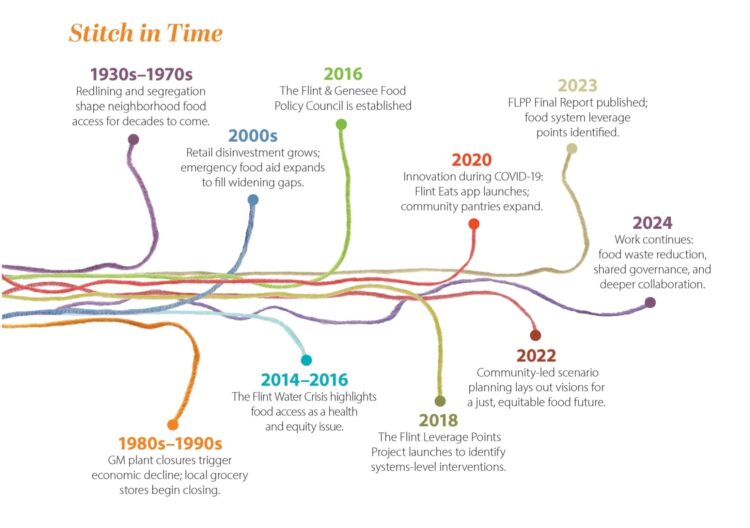
In Flint, residents are leading a movement that redefines what equitable access to healthy food looks like, rooted in community priorities, partnerships, and innovation. Since 2013, the Community Foundation of Greater Flint has partnered with grassroots leaders, neighborhood groups, and local organizations to elevate food justice efforts already in motion.
Prosperity in Action: Advancing Healthy Food Access
In Flint, residents are leading a movement that redefines what equitable access to healthy food looks like, rooted in community priorities, partnerships, and innovation.
Since 2013, the Community Foundation of Greater Flint has partnered with grassroots leaders, neighborhood groups, and local organizations to support and amplify existing food justice efforts. Together, they have built a more connected and coordinated food system that centers on community strengths and lived experiences.
At the time, many leaders were making meaningful progress—but without a shared table. CFGF stepped in to align efforts, support community-driven solutions, and invest in food infrastructure that reflects Flint’s values and vision.
Shared Leadership in Action
A key outcome of this collective effort is the establishment of the Flint & Genesee Food Policy Council, now housed at the Crim Fitness Foundation. The Council provides a framework for collaboration and shared decision-making, grounded in trust and transparency.
“Cross-collaboration is modeled in our structure in a lot of ways,” says Samantha Farah of the Crim Fitness Foundation. “We were intentional from the start. Our leadership team includes community members, institutional partners, and business owners—people representing different stakeholders. We make decisions collaboratively.”
With deep relationships and a trusted convening role, CFGF helped reduce duplication, align funding, and foster lasting coordination. What began as responsive grantmaking has become a community-led system shift.
Systems Thinking Rooted in Community
Through a partnership with Michigan State University’s Flint Leverage Points Project, residents and local leaders mapped the food system, from production to consumption to waste, and identified key areas for sustainable change.
Their work highlighted opportunities that are now driving long-term progress, including food hubs, mobile markets, food reclamation, and deeper neighborhood engagement.
“Flint’s food system is changing because the community is leading,” says Damon Ross, Program Officer. “Our role is to listen, invest, and get out of the way. That’s how you build real, sustainable change.”
Community Innovations with Lasting Impact
Today, Flint’s food system reflects the brilliance, resilience, and leadership of its people.
Examples of community-driven solutions include:
- The Flint Fresh Food Hub and Mobile Market, delivering fresh, local produce directly to neighborhoods
- Food reclamation programs, reducing waste and increasing access
- The Flint Eats App, connecting residents to healthy food options and local resources
- The Hasselbring Senior Center pantry, meeting the needs of older adults with dignity and care
These efforts are not temporary fixes—they are building blocks for a food future designed by and for the community.
Building Toward Food Sovereignty
Across every step of this journey, Flint residents have led with clarity, care, and vision. The Flint Leverage Points Project not only identified systemic barriers but also highlighted community-driven leverage points, strategic, values-based solutions with long-term impact.
What began as a call to connect has evolved into a national model for transforming the food system, centered on community wisdom and sustained by collective action.

Leverage Points Project
The Community Foundation of Greater Flint is partnering with Michigan State University to engage in a community-based research project aimed at better understanding the food system in Flint, Michigan. This project examines all aspects of the food system, including production, distribution, access, consumption, and waste.




